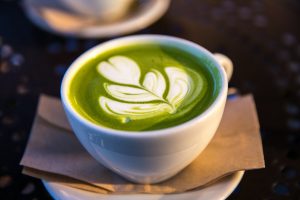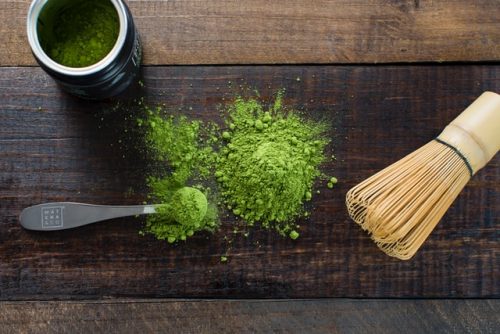
You’ve probably heard of matcha tea by now. It’s sold at cafes and coffee shops. It’s picked up steam in the past few years, prompting even Dunkin Donuts to add it to its menu. But you might be wondering what matcha tea actually is.
More importantly, what’s all the hype about? What benefits does this tea have to offer? Let’s take a closer look at matcha tea and some of the reasons why you might want to consider drinking it.
What Is Matcha Tea?
Matcha is a type of green tea that’s derived from young tea leaves. They’re ground into a bright green powder, which is then whisked with hot water. The end result is a bright green, frothy drink. It’s a pretty photogenic beverage, making it a popular option to share on social media platforms. This has helped increase its popularity.
How Is Matcha Tea Made?
The process of making matcha tea is vastly different from the process used to make traditional green tea. With green tea, the leaves are discarded, and you drink the water it’s infused in.
With matcha, on the other hand, you’re drinking the whole tea leaves. The end result? You’re reaping extra nutritional benefits from the leaves that are typically discarded from green tea.
What Does Matcha Green Tea Taste Like?
Have you ever wondered what this green drink tastes like? It’s known to have a slightly bitter taste with hints of vegetables, umami, and of course, sweetness.
Although you can drink pure matcha tea, some people prefer to add it to a smoothie, latte, or green juice to help reduce some of the bitter flavor. That being said, many people enjoy matcha tea’s unique flavor profile.
Benefits of Matcha Tea

One of the main reasons matcha tea has gained so much popularity in recent times is because it offers so many great health benefits. Since it’s derived from green tea, it offers the same benefits.
Here are some of the most notable benefits of matcha tea.
It’s a good source of antioxidants.
In fact, it’s one of the most antioxidant-rich teas. Research has found that antioxidants have more than 130 times more antioxidants than low-grade green tea varieties and three times the number of antioxidants than other high-quality teas.
It helps provide immune system support.
Drinking matcha tea can help keep the doctor away. In addition to the antioxidants it contains, matcha is also a good source of vitamin C, zinc, magnesium, and selenium.
It promotes good heart health.
Thanks to its high-antioxidant content, matcha tea has been found to offer a number of benefits for good cardiovascular health. It contains vitamins and nutrients that help fight against heart disease, and it’s also been found to help lower blood pressure readings. One small study also found that matcha could help improve cholesterol and triglyceride levels, but more research is still needed in this area. Combining matcha tea with a well-balanced diet and exercise regimen, as well as any recommendations from your cardiologist, could help improve your heart health.
It offers anti-inflammatory properties.
Matcha is believed to be a powerful inflammation reducer for people suffering from autoimmune diseases like Rheumatoid Arthritis (RA), lupus, Sjorgens, scleroderma. It may also help provide relief for diseases like inflammatory bowel disease (IBD), asthma, allergies, and more.
It can provide calming effects.

Matcha tea contains an amino acid called L-Theanine. This can help boost your gamma-aminobutyric acid (GABA), serotonin and dopamine levels. These neurotransmitters help regulate our moods and emotions.
It can give you more energy and make you more productive.
Those same neurotransmitters we just mentioned above also play a role in our ability to concentrate, as well as our focus and alertness. Thanks to matcha tea’s moderate caffeine content, this tea can also help boost our energy levels for up to six hours at a time, which can make us more productive in general. Some tea drinkers like to drink matcha tea for an energy boost before they head to the gym for a workout.
It could potentially aid in weight loss.
Matcha tea contains fiber and other nutrients that can help aid in weight loss. It could potentially boost your metabolism to help you burn more calories and fat. Research has found that consuming matcha powder can lead to weight loss — without any changes to diet or exercise. What’s more, matcha has been scientifically proven to help reduce belly fat.
It might help protect us against cancer.
Research has found that the catechins, a type of antioxidant found in matcha tea, may help prevent cancer cells from forming. In animal studies, green tea (which matcha originates from) helped reduce tumor size and growth of breast cancer. It has also been linked to reduced risks for prostate, skin, liver, and lung cancers.
It can help boost cognitive function.
As it turns out, matcha is good for our minds. In addition to improving focus and concentration as mentioned above, matcha may also help improve memory and promote better oxygen flow to the brain.
It may promote good liver and kidney health.
Some research has found that matcha can help protect the liver from damage. In one study of people with nonalcoholic fatty liver disease, those who were given green tea extract for three months had significant improvement. Another study found that diabetic rats who were given matcha experienced an improvement in both liver and kidney function.
It can help improve skin health and complexion.
The antioxidants in matcha could help protect our skin from skin cancer-causing UV rays. They may also eliminate harmful free radicals. Matcha tea drinkers also tend to take on a healthy skin glow and see an improvement in acne!
As you can see, there are many great reasons to incorporate matcha tea into your diet. From immune system support and improved heart health to weight loss and glowing skin, matcha just may be the miracle tea you’ve been looking for. Make a cup of matcha tea today and begin drinking your way to better health!
